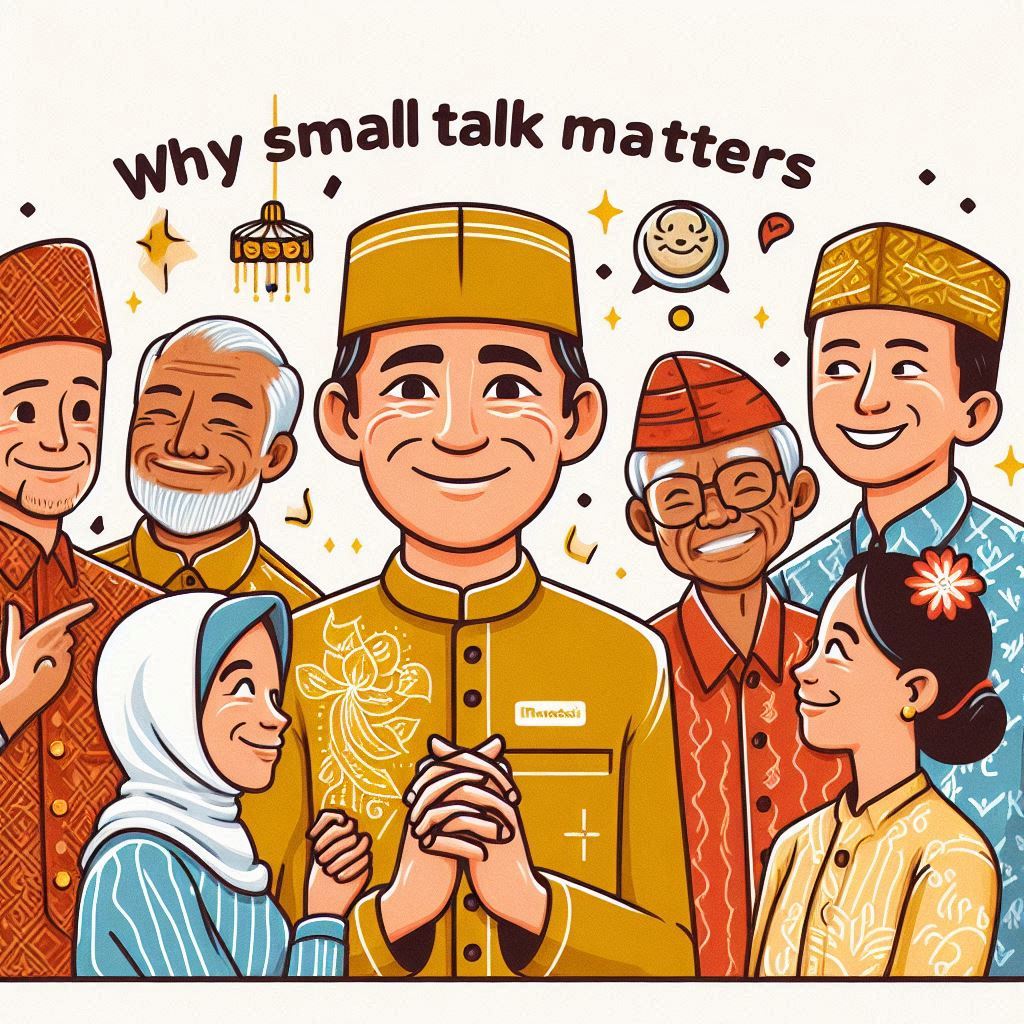Why Small Talk Matters: What Indonesia’s Culture of Warmth Teaches Us About Emotional Intelligence

In Indonesian culture, small talk isn’t small. It’s a reflection of respect, warmth, and emotional depth. Here’s how this seemingly simple habit can teach us about empathy in a fast world.
CHARACTER LEARNING – I used to wonder why my uncle, before discussing anything important, would ask how I slept the night before, whether I’d eaten, and if the rain had disturbed me. I thought it was just his way of filling time or avoiding awkward silence. But as I grew older—and especially after I lived abroad—I realized those little questions weren’t just pleasantries. They were doorways to connection.
In Indonesia, we call it basa-basi—small talk. But don’t let the term fool you. In a culture deeply rooted in warmth, relationships, and subtlety, basa-basi isn’t just social fluff. It’s emotional intelligence at work, wearing a humble smile.
Not Just Small Talk, but Soft Touch
In many Western settings, efficiency is often king. Meetings are to the point, emails are direct, and conversations often skip the warm-up. But in Indonesia, conversations are more like preparing tea—slow, gentle, and full of meaning beyond words.
“Sudah makan?” (Have you eaten?)
“Hujan semalam deras, ya?” (Heavy rain last night, huh?)
These aren’t distractions. They’re subtle signs that say: I see you. I acknowledge your humanity before we dive into the business. In a world where people are desperate to be seen, this gentle form of communication offers something rare: emotional safety.
A Cultural Blueprint for Emotional Sensitivity
Why do Indonesians tend to warm up first before discussing serious matters?
Because in many parts of the country, harmony is valued over confrontation. Directness isn’t the default. Feelings matter. How you say something can be just as important as what you say. So basa-basi isn’t avoidance—it’s cushioning. It’s a way to make sure the heart is ready before the brain takes over.
This kind of emotional awareness is something the modern world desperately needs—especially for children growing up in hyper-logical, fast-paced environments.
What We Can Learn in a Modern Context
You don’t have to be Indonesian to appreciate the power of warm-up conversations. In fact, many cultures have some version of this, but globalization has a way of replacing warmth with speed.
In parenting, leadership, therapy, and even friendship, a moment of soft presence can change everything.
- Parents who greet their kids with gentle questions instead of immediate instructions build more emotionally safe homes.
- Leaders who ask about how their team feels before jumping into KPIs often find greater loyalty.
- Teachers who start class by asking, “How are you really feeling today?” create space for true learning.
What Indonesia shows us is that emotional intelligence doesn’t always look like deep conversations or polished psychology. Sometimes, it’s just checking in—over tea, through traffic jokes, or in the shade of a warung.
The Psychological Depth Behind Warm Culture
From a psychological perspective, small talk in warm cultures serves to regulate anxiety, affirm belonging, and lower emotional defenses. It’s a way of creating what therapist Carl Rogers once called unconditional positive regard—a sense that you matter, just as you are.
In trauma-informed psychology, safety is the foundation for healing. In Indonesian culture, the simple habit of not diving in too quickly is like emotional first aid.
This isn’t about pretending everything is fine. It’s about creating a soft landing so that honesty can eventually emerge with gentleness.
When Small Talk Becomes Spiritual
If you look closely, Indonesian basa-basi isn’t only about social etiquette—it has spiritual roots. The way we speak reflects the Javanese philosophy of eling lan waspada (remember and be aware), or the Sufi wisdom of gentle presence in every word.
To ask, “Apakah keluarga sehat?” (Is your family well?) isn’t just checking a box. It’s a practice of attention, of being fully here with another human being. And in this distracted age, that’s almost sacred.
What Happens When We Lose This?
Urbanization, digital culture, and imported efficiency have slowly made basa-basi feel outdated to some young people. Scrolling replaces eye contact. Conversations become transactional. Even family dinners become silent.
But maybe that’s exactly why we need to revive this old wisdom.
Because underneath it all, small talk is soul talk. It’s how a society builds quiet empathy. And empathy—real, human, non-automated empathy—is what will keep our world from becoming too cold to care.
Simple Ways to Practice Warmth
You don’t have to speak Indonesian or live in a village to practice this:
- Start meetings or classes with one personal question.
- Ask someone how they slept or how their day is going—with real curiosity.
- Slow down before you correct or criticize—warm the room first.
- When reconnecting with someone, don’t rush to “what’s new”—touch base with “how have you been, really?”
These are not time-wasters. These are love-layers.
In the End, We’re All Just Looking for Connection
Whether you’re in Jakarta or New York, London or Lombok, the human heart responds to warmth. The Indonesian way of small talk reminds us that even a passing question—if asked with sincerity—can be a door to healing, trust, and understanding.
So the next time someone asks you, “Sudah makan?”—don’t just say yes.
Pause. Feel it. And maybe ask back.
Because maybe, just maybe, that’s where true communication begins.[*]
